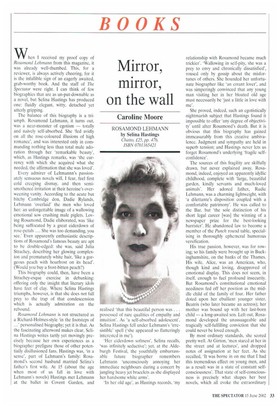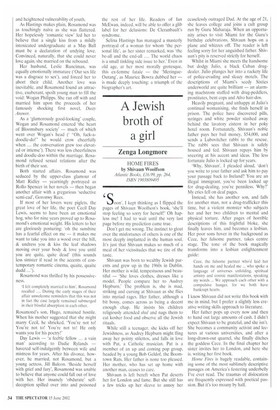Mirror, mirror, on the wall
When I received my proof copy of Rosamond Lehmann from this magazine, it was already well-thumbed. This, for a reviewer, is always actively cheering, for it is the infallible sign of an eagerly awaited, grab-worthy book. And the staff of The Spectator were right. I can think of few biographies that are as un-put-downable as a novel, but Selina Hastings has produced one: fluidly elegant, witty, detached yet utterly gripping.
The balance of this biography is a triumph. Rosamond Lehmann, it turns out, was a near-monster of egotism — totally and naively self-absorbed. She 'fed avidly on all the rose-coloured illusions of high romance', and was interested only in commanding nothing less than total male adoration through her 'remarkable beauty', which, as Hastings remarks, was 'the currency with which she acquired what she needed, the affirmation that she was loved'.
Every admirer of Lehmannn's passionately sensuous novels will, I fear, feel first cold creeping dismay, and then semismothered irritation at their heroine's overweening vanity. According to the acute but bitchy Cambridge don, Dadie Rylands, Lehmann 'overlaid' the men who loved her: an unforgettable image of a wallowing emotional sow crushing male piglets. Loving Rosamond, Dadie elaborated, was 'like being suffocated by a great eiderdown of rose-petals .... She was too demanding, you see.' Even apparently enthusiastic descriptions of Rosamond's famous beauty are apt to be double-edged: she was, said Julia Strachey, describing her glowing complexion and prematurely white hair, 'like a gorgeous peach with hoarfrost on its head'. (Would you buy a frost-bitten peach?) This biography could, then, have been a Strachey-esque exercise in debunking: offering only the insight that literary idols have feet of clay. Where Selina Hastings triumphs, however, is that she does not fall prey to the trap of that condescension which is actually admiration on the rebound.
Rosamond Lehmann is not structured as a Richard-Holmes-style 'in the footsteps of ...' personalised biography; yet it is that. As the fascinating afterword makes clear, Selina Hastings writes tartly yet movingly precisely because her own experiences as a biographer prefigure those of other potentially disillusioned fans. Hastings was, 'in a sense', part of Lehmann's family: Rosamond's second husband married Selina's father's first wife. At 15 (about the age when most of us fall in love with Lehmann's novels) Hastings met Lehmann at the ballet in Covent Garden, and realised 'that this beautiful person was . possessed of rare qualities of empathy and intuition'. As 'a self-absorbed adolescent', Selina Hastings fell under Lehmann's 'irresistible' spell ('she appeared so flatteringly interested in me').
'Her eiderdown softness', Selina recalls, 'was infinitely seductive'; yet, at the Aldeburgh Festival, the youthfully embarrassable future biographer remembers Lehmann 'unconsciously annoying her immediate neighbours during a concert by jangling heavy jet bracelets as she displayed her handsome white arms'.
'In her old age', as Hastings records, 'my relationship with Rosamond became much trickier'. 'Wallowing in self-pity, she was a prey to envy and chronically dissatisfied', roused only by gossip about the misfortunes of others. She hounded her unfortunate biographer like 'an errant lover', and was simperingly convinced that any young man visiting her in her bloated old age must necessarily be 'just a little in love with me'.
She proved, indeed, such an egotistically nightmarish subject that Hastings found it impossible to offer 'any degree of objectivity' until after Rosamond's death. But it is obvious that this biography has gained immeasurably from this creative ambivalence. Judgment and sympathy are held in superb tension; and Hastings never lets us forget Rosamond's underlying 'fragile selfconfidence'.
The sources of this fragility are skilfully drawn, but never explained away. Rosamond, indeed, enjoyed an apparently idyllic childhood, complete with 'large, beautiful garden, kindly servants and much-loved animals'. Her adored father, Rudie Lehmann, was a charming lightweight, with 'a dilettante's disposition coupled with a comfortable patrimony'. He was called to the Bar. but 'the sole distinction of his short legal career [was] the winning of a newspaper prize for the best-looking barrister'. He abandoned law to become a member of the Punch round table, specialising in thoroughly ephemeral humorous versification.
His true passion, however, was for rowing; so his family were brought up in Buckinghamshire, on the banks of the Thames. His wife. Alice, was an American, who, though kind and loving, disapproved of emotional display. This does not seem, in itself, enough to fuel profound insecurity. But Rosamond's constitutional emotional neediness fed off her position as the middle child of the family of four, Her father doted upon her ebullient younger sister, Beatrix (who later became an actress); her mother was bound up with her last-born child — a long-awaited son. Left out, Rosamond developed the unassuageable and tragically self-fulfilling conviction that she could never be loved enough.
By most ordinary standards, she scored pretty well. At Girton, 'men stared at her in the street and at lectures', and dropped notes of assignation at her feet. As she recalled, 'It was borne in on me that I had this tremendous effect on young men, and as a result was in a state of constant selfconsciousness'. That state of self-consciousness is precisely what shapes her best novels, which all evoke the extraordinary and heightened vulnerability of youth.
As Hastings makes plain, Rosamond was as touchingly naïve as she was flattered. Her hopelessly 'romantic view' led her to believe that a single kiss from a mildly intoxicated undergraduate at a May Ball must be a declaration of undying love. Convinced, naturally, that she could never love again, she married on the rebound.
Her husband, Leslie Runciman, was equally emotionally immature (Our sex life was a disgrace to sex'), and forced her to abort their child. Another love was inevitable, and Rosamond found an attractive, exuberant, spoilt young man to fill the void: Wogan Philipps. She ran off with and married him upon the proceeds of her famously shocking first novel, Dusty Answer.
As a 'glamorously good-looking' couple, Wogan and Rosamond entered 'the heart of Bloomsbury society' — much of which went over Wogan's head (' "Oh, fuck-adoodle-do!" he would crow cheerfully when ... the conversation grew too elevated or intense'). There was less cheerfulness and doodle-doo within the marriage. Rosamond refused sexual relations after the birth of their son.
Both started affairs. Rosamond was seduced by the upper-class glamour of Matt Ridley — yearningly portrayed as Rollo Spencer in her novels — then began another affair with a gregarious 'seductive semi-cad', Goronwy Rees.
If most of her lovers were piglets, the great love of her life, the poet Cecil Day Lewis, seems to have been an emotional hog, who for nine years proved up to Rosamond's emotional weight. His letters to her are gloriously posturing: 'oh the sunshine has a fearful effect on me — it makes me want to take you into a wood over the hill, & undress you & kiss the leaf shadows moving over your body & love you until you are quite, quite dead' (this sounds less sinister if read in the accents of contemporary romantic cinema, quaite, quaite dudd Rosamond was thrilled by his possessiveness.
'I felt completely married to him'. Rosamond recalled .... During the early stages of their affair unwelcome reminders that this was not in fact the case largely remained submerged in their blissful absorption in each other.
Rosamond's son, Hugo, remained hostile. When his mother suggested that she might marry Cecil, he shrieked, 'You're not to! You're not to! You're not to! He only wants you for his poetry!'
Day Lewis — 'a feeble fellow ... a vain man' according to Dadie Rylands — havered self-indulgently between wife and mistress for years. After his divorce, however, he married, not Rosamond, but a young actress, Jill Baicon. 'Beside herself with grief and fury', Rosamond was unable to believe that anyone could fall out of love with her. Her insanely 'obdurate' selfdeception spilled over into and poisoned the rest of her life. Readers of Ian McEwan, indeed, will be able to offer a glib label for her delusions: De Cleranbault's syndrome.
Selina Hastings has managed a masterly portrayal of a woman for whom 'the personal life', as her sister remarked, was 'the be-all and the end-all .... The world chaos is a small tinkling side issue to her.' Even in old age, at her most morally grotesque, this ex-femme fatale — the 'MeringueOutang', as Maurice Bowra dubbed her — is made deeply touching: a triumph of the biographer's art.



































































 Previous page
Previous page